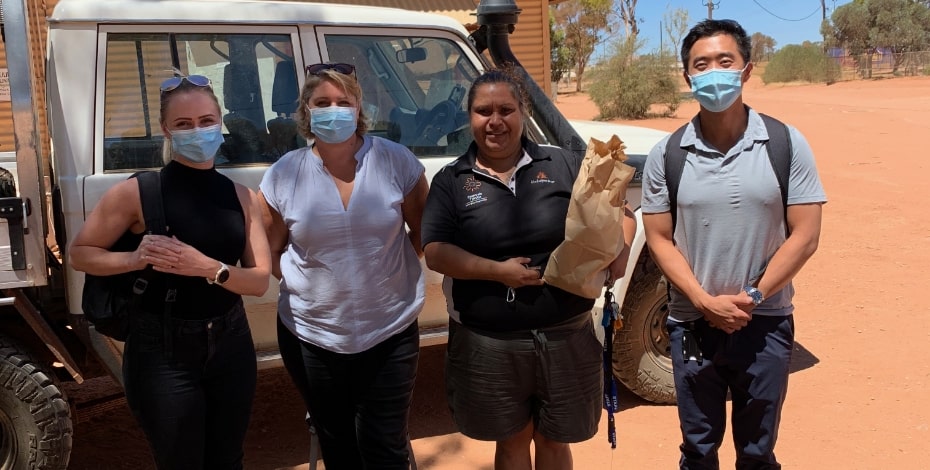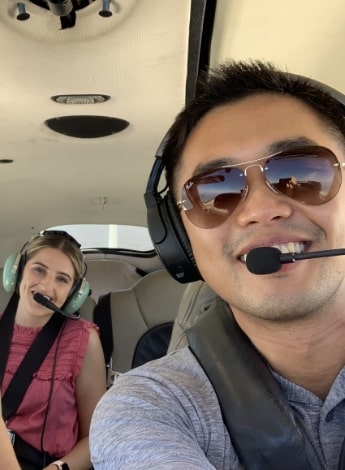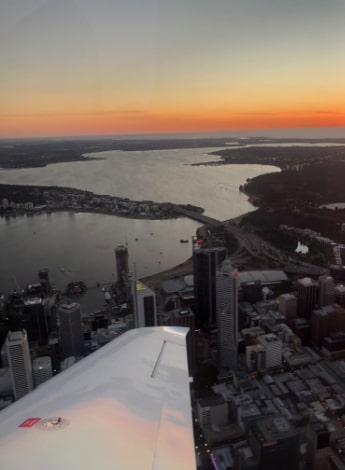
Flying physios reach remote WA communities

Fly2 Health Group is an allied health service based in Perth, which regularly flies physiotherapists and other allied health clinicians out to rural and remote towns and communities in Western Australia. We talk here to founder and pilot Kennedy Lay about flying and physiotherapy.
When COVID-19 brought Australia to a standstill in 2020, physiotherapist Kennedy Lay jumped at the opportunity to investigate alternative careers, putting his career in private practice on hold while he pursued a commercial pilot’s licence with Qantas.
Ironically, completing the commercial training pathway made Kennedy realise that he didn’t want to work as a commercial pilot.
‘I’d always wanted to be a pilot as a boy but after finishing the program I realised how mundane commercial piloting is,’ Kennedy says.
A conversation with one of his physiotherapy clients gave Kennedy a way to combine his two careers.
‘One of my clients is the CEO of a charter aircraft company—they have a fleet of about 40 aircraft—and he said to me, “Why don’t you combine the two and start flying yourself to rural and remote WA?”’ Kennedy says.
Kennedy took the plunge last May, moving to Western Australia and flying to Narrogin, a town almost 200 kilometres from Perth in WA’s Wheatbelt, to offer physiotherapy services.
‘I found myself doing some private work there and I realised just how much demand there was for private physiotherapy services, let alone anything else—WorkCover, NDIS, there was so much demand—and Narrogin is not even that far away from Perth.
'So that led to a whole cascade of clients’ requests for other allied health professions, including psychology and occupational therapy,’ he says.
‘One by one we added new locations and new services.
'As of today we have 13 locations that we visit fortnightly and we have about 20 clinicians over four disciplines.’

The Fly2Health team readies to fly out. From left to right: occupational therapist Michelle
Broughton, occupational therapist Jarla Anderson and director and physiotherapist Kennedy Lay (Photo:Fly2Health).
Kennedy’s company, Fly2 Health Group, now has four physiotherapists, two psychologists, five speech pathologists and seven occupational therapists flying to locations stretching from Carnarvon in the north-west to Esperance in the south-east of the state.
In addition to Kennedy, three of the healthcare leads have their pilot’s licences and work dual roles as a pilot and in the community.
Typically, the flights are daytrips, allowing staff to return home at the end of the day.
Many of the clinicians work one or two days a week with Fly2 Health Group while also working at other practices.
‘Everyone [in Perth] is complaining about staff, that they can’t find staff, but we get 7–10 applications a week [from people] wanting to work for us, which is great for us,’ he says.
Fly2 Health Group’s clientele consists mostly of NDIS-funded patients, with a smaller number of private clients.
Aboriginal patients make up about 20 per cent of the case load.
Currently Fly2 Health Group flies to two Aboriginal communities—Tjuntjuntjara, which is 680 kilometres north-east of Kalgoorlie near the South Australian border and more than 1100 kilometres flying from Perth, and Cosmo Newbery, in the far north-western reaches of the Goldfields and more than 800 kilometres flying from Perth.
Kennedy says there is a huge demand for allied health in remote communities like Tjuntjuntjara, as otherwise clients have to drive to the nearest town large enough to have the required clinical services, such as Kalgoorlie or even Perth.
‘It’s very difficult for them to sit in a car on a bumpy road for hours, so if we can deliver the services right to their door, that’s perfect.’
Kennedy says he enjoys the variety and challenges of working with the diverse patients who form Fly2 Health Group’s client base.
‘Private practice was necks, backs, musculoskeletal stuff.

Returning to Perth (Photo: Fly2Health).
'Our clientele is stroke, cerebral palsy, paediatrics and car accidents, so it’s a mix between neuro and musc.
'The challenge lies in adapting to a different clientele.
'We might have five clients a day—one might be paediatric, one might be a neuro client, one might be a musc client.
'Additionally we need to consider the different cultural backgrounds for the people we treat, who may be Aboriginal and/or Torres Strait Islander, so it’s juggling between a lot of different domains and backgrounds with a culturally and linguistically diverse population.
'It’s not just the clinical skills that are challenging,’ he says.
‘We try to make our services pretty consistent so it’s all fortnightly.
'Ideally, we’d love it to be weekly as fortnightly presents some challenges that come with not seeing clients as often as we’d like—for example, in learning therapy programs.
'The next step for us in the business is to train and upskill local allied health assistants so that they can keep implementing the program when we’re not there.’
The logistics of running a fly-in fly-out service are immense, says Kennedy.
‘It’s a very complex operation.
'From an aviation perspective, there is the weather, the pilots, the plane, service intervals
for the plane—some you can plan for, some you can’t.
'Between that and then juggling four clinical disciplines of about 20 staff and whether they do home visits, community visits or clinic, the complexity of the operation is the biggest challenge,’ Kennedy says.
‘Aviation allows us to get there quickly; it allows us to get our clinicians home at
the end of the day so they can go back to their families.’
Fly2 Health Group is planning to expand its current service further into WA’s northern regions, the Pilbara and the Kimberley, this year.
With the move to fly further away from Perth, Kennedy says it may be necessary to do longer trips, with overnight stays.
Ultimately, Kennedy hopes to expand into other states with a lot of remote communities, including Queensland, the Northern Territory and South Australia.
Main image: Visiting the Tjuntjuntjara community. From left to right: Fly2 Health occupational therapist Michelle Broughton, Shine disability support coordinator Victoria Crisp, Tjuntjuntjara community nurse and Fly2 Health director and physiotherapist Kennedy Lay (Photo: Spinifex Health Service).
© Copyright 2025 by Australian Physiotherapy Association. All rights reserved.





